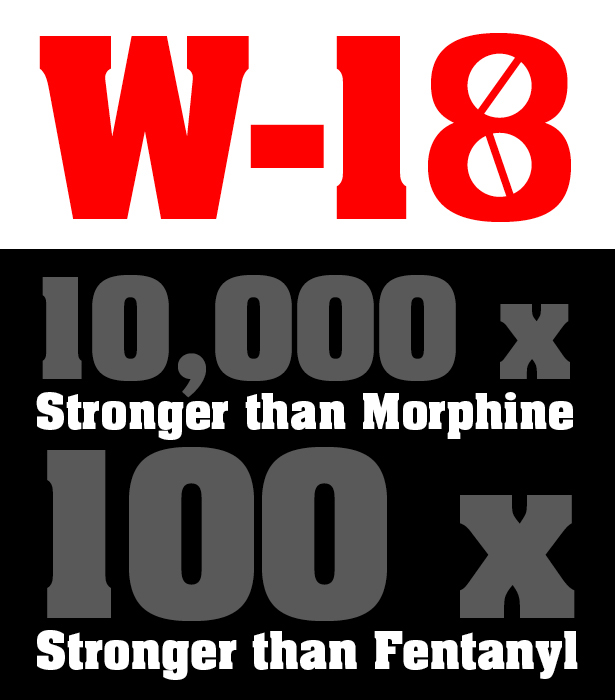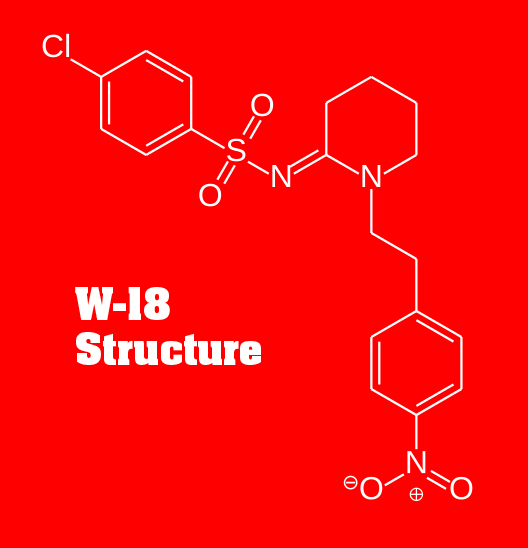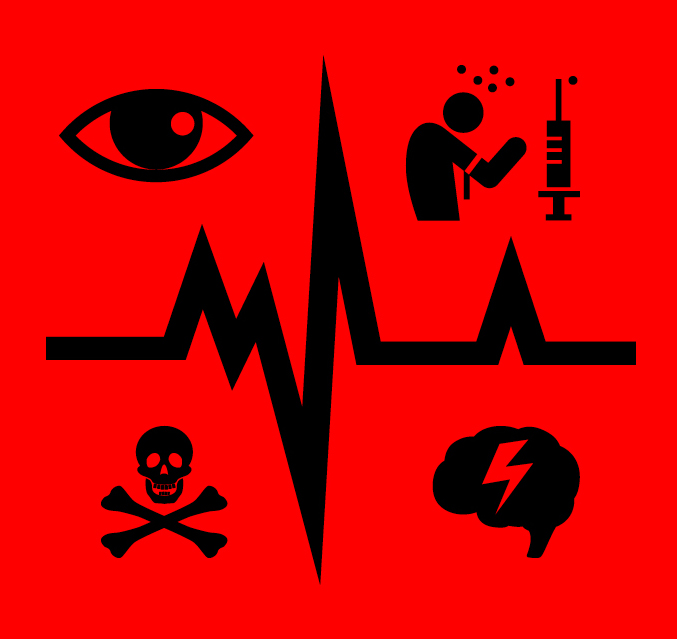
A new synthetic pill has crept its way into the drug market and has many fearful of the potential dangers and others skeptical of its exact nature. W-18 is said to be 10,000 times stronger than morphine and 100 times stronger than fentanyl. The scariest thing about the drug is that it’s still legal.
After years of being a forgotten drug, W-18 was recently brought back into the limelight. It was discovered during a drug bust near Calgary, Canada in August 2015. During the raid, officers found three W-18 pills out of 110 that they believed to be fentanyl. [1] In March 2016, a man from Miramar, Florida was arrested with 2.5 pounds of W-18 he purchased in China. [2] A month later, officials in Edmonton announced the seizure of four kilograms of pure W-18. [3]
The drug’s potency coupled with an assumed potential for abuse has caused many to call for its illegalization. However, knowledge about the drug is limited, leaving open a debate about just how dangerous W-18 really is.
Little is known about W-18 but researchers do know its extremely powerful
While it may be unsafe, there’s no concrete evidence that the drug is abusive, addictive or even deadly.
One of the primary debates surrounding W-18 is whether or not to classify it as an opioid. Opioids are highly abusive and addictive, so if a drug this powerful were classified as an opioid, it could prove to be extremely dangerous. The drug was one of several compounds discovered at the University of Alberta in 1981. The series of drugs (named W-1 through W-32, with W-18 being the strongest), were a part of a 1984 U.S. patent. Each of the drugs in the group were shown to be painkillers or blockers of the painkilling effect of morphine. However, the drugs were never tested on humans. [4]

W-18 is made of nitrophenylethyl, piperidinylidene and benzenesulfonamide. Its chemical formula is C19H20ClN3O4S. When people hear that the drug is so much more potent than some of the most powerful known opioids and law enforcement officials are warning of a new potential drug threat, many assume that W-18 is dangerous. While it may be unsafe, there’s no concrete evidence that the drug is abusive, addictive or even deadly. [5]
One of the founders of the drug recounted a story in Forbes related to testing the drug, where mice were administered the chemical at a dose similar to aspirin. Upon injection, the mice stood up for a minute and then fell over unconscious, remaining this way for five days. When the mice woke, there were seemingly no lingering effects, other than extreme hunger and thirst caused from being out for so long.
What exactly is W-18? Is it an Opioid?
The problem when trying to make an authoritative classification of W-18 is that there is no real conclusive evidence of anything. Because of the drug’s potency, pharmaceutical companies were scared off. None of the W compounds were purchased by pharmaceutical companies or subject to any clinical trials. This is why there is little authoritative information about the drug.
Any claims about the drug’s pharmacological profile are speculative at best despite warnings and bold claims from law enforcement officials and members of the media, no peer-reviewed data about the absorption, distribution, metabolism or excretion of W-18 exists. No conclusive proof that the drug binds to opioid receptors in the brain and spine has ever been given. Any claims about the drug’s pharmacological profile are speculative at best.
Some U.S. companies sell the drug as a reference standard to provide chemists with an authenticated version of the drug for study. This allows them to compare and confirm the identity of other drugs found in illicit substances or deceased individuals. One of these companies, Cayman Chemical Company in Ann Arbor, Michigan, has been anticipating the eventual illegalization of W-18 for over a year.
“What usually happens is a crime laboratory finds an unusual peak or other signal that some other drug is in their seized material,” said owner of Cayman Chemical Company, Kirk Maxey, in a Forbes article.”We work with them to come up with possibilities and then make the authentic compounds for comparison.”
Maxey also claimed that analogs (different chemical variations) of the drug have already begun showing up in North American crime labs. This generally signals that illegal drug makers are making small chemical changes in the formula in anticipation that the drug will become illegal.
Should Americans be Worried?

With the U.S. drug crisis currently at an all-time high, any time a new drug hits the market, there’s understandable cause for concern. This is especially true when it comes to synthetic drugs, which have become more and more dangerous. Though W-18 is not directly related to any current synthetic drug on the market, it’s worth noting that the use of synthetic drugs has led to strokes, seizures, paranoia, psychiatric illness, rapid heart rate, self-harm, severe vomiting, and death. [6]
Add in the fact that there are no established medical uses for W-18 and very little information about the drug and its effects available, and there is certainly cause for concern. While we don’t know enough about W-18 to make any definitive claims about its dangers, we also don’t know enough to say it’s safe either.
More research is needed to make any determinations about W-18. Being that the drug has only resurfaced in recent years, it’ not likely that you or someone you care for will come in contact with the drug. Even further, you should only take prescription drugs when a doctor has deemed them medically necessary. Since W-18 is not currently a prescribed drug, there is no reason for you to ever use W-18. You should stay away if you come into contact with it.
We Are On The Forefront of Drug and Addiction Research
At Behavioral Health of the Palm Beaches, we are not only committed to providing world-class addiction recovery services for our Florida patients, but we also pride ourselves on conducting constant industry research on current topics and trends. We make it our jobs to be in the know so that we can arm our patients with more information to be successful in a drug-free lifestyle.
If you or a loved one is struggling with habitual abuse of prescription pills or synthetic drugs, we advise you to get help before it’s too late. The professionals at Behavioral Health of the Palm Beaches are dedicated to helping you achieve your recovery goals and maintain long-term sobriety. Contact us today at 888-432-2467 to learn more about our services.



